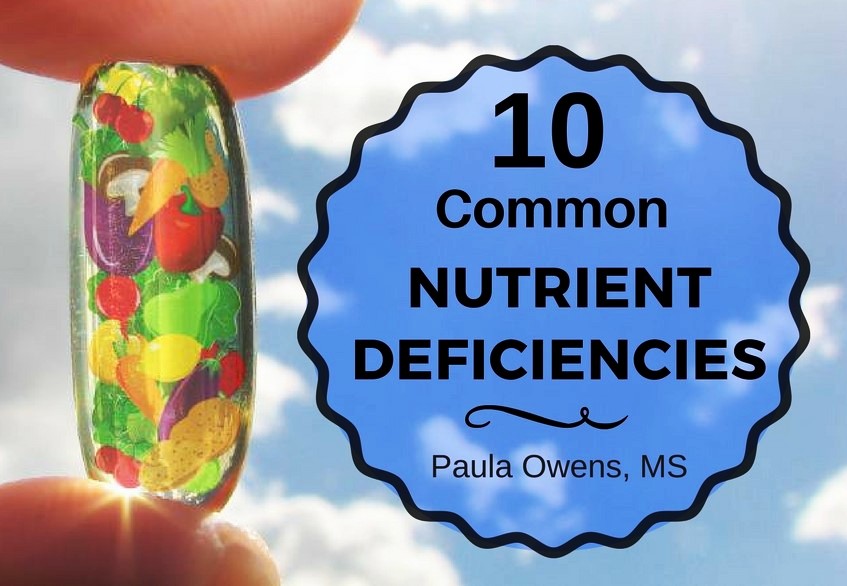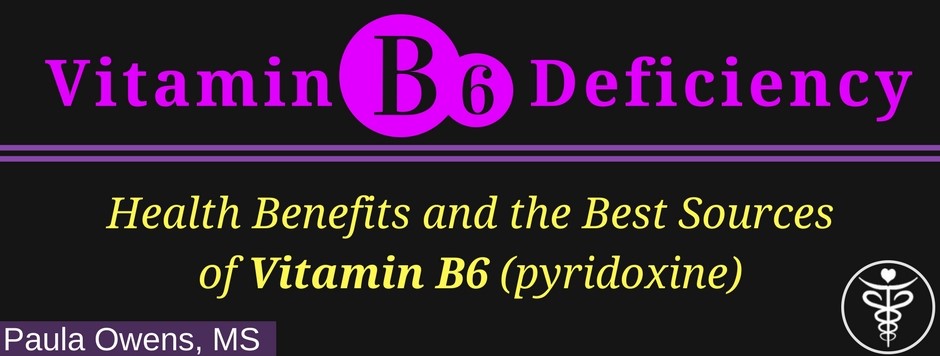Educating and Empowering You to Heal, Thrive, and Live a Happy, Healthy Lifestyle
10 Common Nutrient Deficiencies
 Nutrient deficiencies are increasingly common nowadays. A deficiency in any single nutrient can affect thyroid function, hormone production, immune function, energy levels, metabolism, mood, memory, the appearance of your hair, skin and nails, and the overall condition of your health. Increased risk of dementia, heart disease, depression, osteoporosis, and cancer can be attributed to nutrient deficiencies.
Nutrient deficiencies are increasingly common nowadays. A deficiency in any single nutrient can affect thyroid function, hormone production, immune function, energy levels, metabolism, mood, memory, the appearance of your hair, skin and nails, and the overall condition of your health. Increased risk of dementia, heart disease, depression, osteoporosis, and cancer can be attributed to nutrient deficiencies.
Causes of Nutrient Deficiencies
— Nutritionally-void diets secondary to poor food choice. So many people are under-nourished, yet overfed (nutrient density is missing) feasting on non-organic frankenfoods. Shop for organic, non-GMO, nutrient-dense and locally-grown foods. Non-organic foods, fast foods and all processed foods contain little (if any) vitamins, minerals and nutrients, and a chemical cocktail of glyphosate (a mineral chelator), pesticides, herbicides, GMOs and toxic metals.
— Vegan and vegetarian diets
— Mineral-depleted soils and poor quality agriculture caused by failure to till under soils, rotate crops, or use natural fertilizers. The vitamin and mineral content in fruits and vegetables have declined up to 76% from 1940-1991. The heavy use of chemical fertilizers, glyphosate, herbicides and pesticides have damaged the soil of vital nutrients, and destroyed the healthy and necessary microbes that plants need in order to absorb the minerals. This has caused many common fruits and veggies to have significantly fewer vitamins and minerals today compared to 50-70 years ago.
— Digestion problems, poor absorption caused by Celiac disease or gut damage, leaky gut, low stomach acid production, bile insufficiency
— Eating the same foods day after day after day after day. Most people’s diets consist of the same 10-20 foods day after day after day. Limiting your food choices leads to deficiencies in several vitamins, minerals and important nutrients
— Gallbladder removal, which increases digestive problems and risk of fat-soluble vitamin deficiencies (vitamins A, D, E and K)
— OTC medications and prescription drugs deplete a multitude of important nutrients
— Oral contraceptives deplete B vitamins, zinc, magnesium, selenium, vitamin C, tryptophan, tyrosine
— Antacids and PPIs: Vitamin B12, vitamin D, thiamine, zinc, calcium, iron, folic acid, magnesium, and disruptions in the microbiome
— Blood pressure drugs: vitamin B6, CoQ10, thiamine, zinc, magnesium, calcium, sodium, potassium
— Antibiotics: healthy flora and disruptions in the microbiome, B vitamins, zinc, magnesium
— Synthroid: iron
— Antidepressants: B vitamins, CoQ10, Vitamin D, essential fatty acids, sodium
— NSAIDs and aspirin: folic acid, vitamin C, iron, vitamin B5, potassium, glutathione
— Cholesterol-lowering statin drugs: CoQ10, Mg, folic acid, Vitamin A, B12, D, E and K
— Metformin: CoQ10, folate (folic acid), vitamin B12
— Alcohol depletes essential vitamins and minerals that your body needs to function properly including vitamin B6, folate, vitamin A, vitamin C, thiamine, riboflavin, pantothenic acid (vitamin B5), vitamin B12, magnesium, and zinc. Thiamine metabolism is greatly affected by alcohol intake, especially heavy drinking. Alcohol also inhibits the liver’s ability to produce digestive enzymes, which makes it difficult for the body to absorb proteins, fats, B vitamins and fat-soluble vitamins.
— Dieting can exacerbate nutrient deficiencies
— Gene mutations, methylation defects
— Inadequate chewing; fast eaters tend to have severe digestive ailments, malabsorption problems and several nutrient deficiencies; they also tend to overeat in attempts to satisfy their nutritionally-depleted status.
— Stress and environmental factors. High stress lifestyles result in multiple nutrient deficiencies, specifically B vitamins, zinc and magnesium.
— Increased nutrient requirements are required during pregnancy and breast feeding; intense exercise; an illness or undergoing chemotherapy; and biochemical individuality
No one is drug deficient — just nutrient deficient.
Symptoms of Nutrient Deficiencies
- Dry skin, itchy skin, weak nails, white spots on nails, dry hair, hair loss
- Addictive tendencies
- Immune dysfunction
- Anxiety, depression, bi-polar, psychiatric disorders, behavioral problems, OCD
- Insomnia, poor dream recall
- Cravings for sugar, carbohydrates or alcohol
- Headaches
- Hormone imbalances, including low testosterone and thyroid dysfunction
- Fatigue, low energy
- Autoimmune diseases
- Poor memory
- Tingling limbs, burning hands and feet
- Inability to focus or pay attention, performance problems
- Muscle cramps, aches and pains
- Weight loss resistance, obesity
- Bleeding gums, gum disease
10 Common Nutrient Deficiencies
1. Essential fatty acids (EFAs) and omega-3 fatty acids are highly beneficial for the prevention and treatment of cardiovascular disease, dry skin, eczema, psoriasis, autoimmune diseases, neurological conditions, cognitive disorders, cancer, inflammation, Crohn’s, hypertension, asthma, PMS, menopause symptoms, hormone imbalances, weight loss resistance, ADHD, anxiety, depression and other mood disorders.
2. Vitamin D is a powerful anti-inflammatory steroid hormone we get from sunlight exposure, food and supplementation. Vitamin D innervates every immune cell.
Vitamin D deficiency is a risk factor for immune dysfunction, cardiovascular disorders, hormone imbalances, aging skin, wrinkles, sarcopenia, osteoporosis, autoimmune disorders, insulin resistance, depression, anxiety, psychological problems, Parkinson’s disease, skin cancer, breast cancer, prostate cancer and other cancers.
3. Vitamin B12 is needed for every cell in the body. It’s involved in normal functioning of the nervous system and immune system. Vitamin B12 is necessary to prevent accumulation of homocysteine, a toxic metabolic byproduct linked to cardiovascular disease and connective tissue problems.
Vitamin B12 deficiency is very common especially in those age 50 and older, vegans, vegetarians, alcoholics, diabetics, those who avoid animal protein, and those with MTHFR defects. Hypochlorhydria, dysbiosis, bacterial overgrowth, H.pylori infections, and GI problems are frequently linked with vitamin B12 deficiency.
Intrinsic factor is produced in the stomach and is necessary for maximal GI absorption of B12. Chronic stress, infections, autoimmune disease, use of antacids, antibiotics, oral contraceptives and other drugs deplete intrinsic factor. The body cannot effectively metabolize B12 without adequate intrinsic factor and deficiencies will eventually occur.
Symptoms of vitamin B12 deficiency include fatigue, depression, mood disorders, weakness, anemia, memory loss, sore tongue, irritability, hair loss, dementia, tinnitus, brain shrinkage, neurological problems, osteoporosis, hypothyroidism, and an increased cardiovascular risk.
4. Vitamin B6 (pyridoxine) is critical for optimal function of our brain and emotional health. It is important for protein metabolism, the nervous, endocrine, and immune systems. Vitamin B6 deficiency can increase the risk for depression and impair cognition, attention, and memory.
Exposure to smoke, pollutants and chemicals is detrimental to B6 status. B6 deficiency is associated with higher levels of inflammation, oxidative stress, poor blood sugar control, elevated homocysteine, and an increased risk of colorectal cancer.
Symptoms of B6 deficiency include pain, inflammation, numbness, hypochlorhydria (low stomach acid), inability to recall dreams, joint stiffness, carpal tunnel, sensitivity to bright lights, tingling extremities, sore tongue, depression, cracks in the tongue, lips and corners of the mouth, and anemia. The liver needs magnesium and B vitamins, particularly B6 to detoxify xenoestrogens.
Alcohol intake dramatically increases the need for vitamin B6, as do certain antidepressants, hormone replacement therapy, oral contraceptives, diuretics, corticosteroids, and some drugs for rheumatoid arthritis.
5. Folate is responsible for repair of DNA and making of red blood cells. Folate deficiency symptoms may include swollen or sore tongue, mouth ulcers, insomnia, fatigue, anemia, nerve damage (peripheral neuropathy), headaches, heart palpitations, cognitive issues such as brain fog, forgetfulness, depression, and behavioral issues. Folate deficiency is also linked to methylation problems, increased homocysteine, coronary heart disease and cancer.
Folate, vitamin B6 and vitamin B12 are important regulators of the metabolism of homocysteine, an amino acid in our blood. When blood levels of these B-vitamins are low, homocysteine rises, increasing the risk of dementia, heart disease and stroke.
6. Thiamine is involved in energy metabolism. It plays a vital role in the health of your nervous system and brain. Psychological stress, hypoglycemia, adrenal insufficiency, alcoholism, low stomach acid, and severe fatigue indicate a need for thiamine.
Early signs of thiamine deficiency include loss of appetite, constipation, irritability, anxiety and depression.
7. Magnesium is the considered to be the anti-stress, relaxation mineral. It’s involved in energy metabolism and responsible for over 300 enzyme reactions in the body. The cardiovascular system, nervous system, muscles, kidneys, liver, brain, hormone-secreting glands, and GI tract all rely on magnesium for their metabolic function.
Those who experience anxiety, insomnia, high blood pressure, muscle cramps, headaches, constipation, insulin resistance, fatigue, irritability, memory loss, stinky feet, PMS, COPD, alcohol withdrawal, restless legs, and diabetes often benefit from magnesium supplementation. Magnesium requirements may also be increased by diets high in protein, fat, sugar, and alcohol.
Decreased absorption of magnesium has been associated with alcoholism, diabetes, the elderly and those with GI problems. Diuretics, certain antibiotics, anticoagulants, corticosteroids, and oral contraceptives compromise magnesium status.
The liver needs magnesium and B vitamins, particularly vitamin B6 to detoxify xenoestrogens.
8. Zinc promotes wound healing, enhances immune function, helps to protect against upper respiratory infections and repair DNA. Zinc deficiency is increasingly common, especially in the elderly, diabetics, vegetarians, and those with poor biochemical pathways. Zinc deficiency is also linked with hypochlorhydria (low stomach acid), excessive alcohol intake, high iron, Alzheimer’s, hypertension, anorexia, bulimia, infections (H.pylori, Candida), Crohn’s disease, and digestive dysfunction.
Zinc helps maintain and stabilize blood sugar, prevents weak immunity, is a precursor to testosterone production, shown to keep depression and anxiety at bay, helpful for acne, eczema, rosacea, diarrhea, rheumatoid arthritis, macular degeneration, support a healthy sense of taste and smell, optimal adrenal and thyroid function, lipid metabolism, digestion and more!
Common signs of zinc deficiency: mental fatigue, hair loss, chronic colds, low testosterone and impotence in men.
9. Iodine deficiency is rampant in the U.S. Iodine protects the breast, uterus, ovaries, thyroid gland and prostate from cancer. It is also a fantastic anti-parasitic!
An iodine deficiency negatively impacts thyroid function, IQ and ovarian function. Iodine/iodide should be considered for breast, uterine and ovarian cysts, fibroids, fibrocystic breast disease, low energy, hot flashes, weight gain, sinus infections, depression, ADD and ADHD, heart disease, increased LDL cholesterol, infertility, cognitive decline, estrogen dominance, radiation exposure, and breast, ovarian and prostate cancer. Fluoride, bromide and chlorine displace iodine in the body.
As halogens (chlorine, bromide, fluoride) and heavy metals run rampant in our environment, risk of iodine deficiency increases significantly.
10. H2O – Water! Dehydration is a cause of many ailments such as low back pain, cravings, dry skin, fatigue, urinary tract infections, kidney stones, headaches, constipation, increased cortisol, dizziness, weakness, poor concentration, toxic buildup, anxiety, and irritability. So, drink up! It’s important to install a water filter in the kitchen and in the shower.
Other common deficiencies
- Healthy gut flora
- Hydrochloric acid (stomach acid)
- Sunshine
Test to Assess – Don’t Guess! One of the best ways to determine your unique nutrient deficiencies and balance your body chemistry is with a functional blood chemistry analysis. Quality nutrients from organic foods, healthy digestion and professional-grade supplements can be highly beneficial in correcting nutrient deficiencies.
Videos
- There’s an 80% chance you may have an iodine deficiency
- Are you low in Magnesium?
- Take Any Prescription Drugs? Better watch this video
- Are you low in the “happy” hormone?
- Fixing Acne Problems



